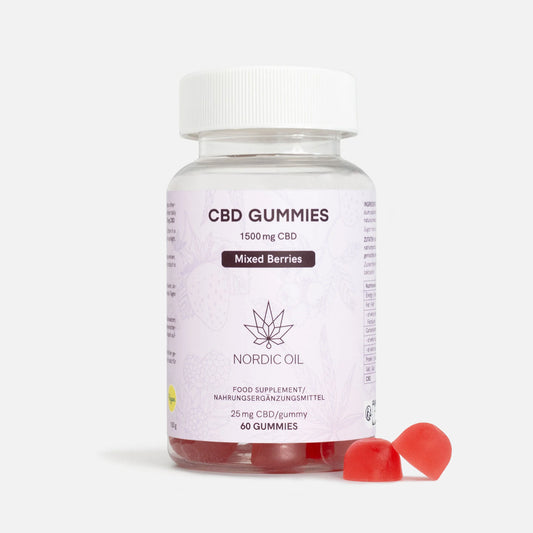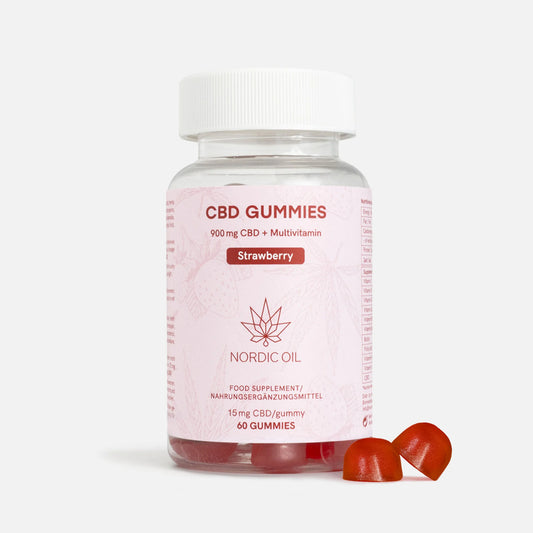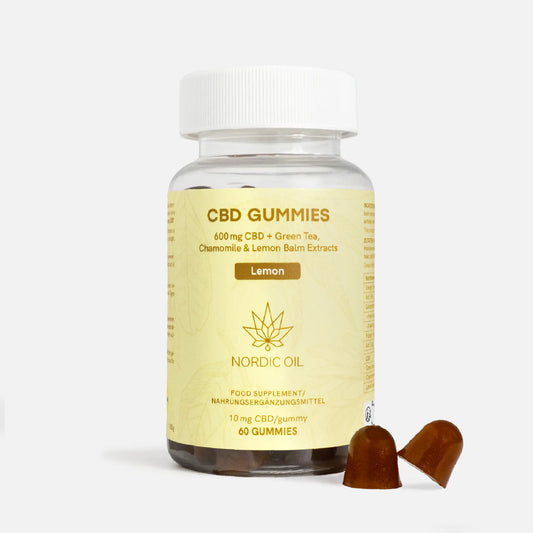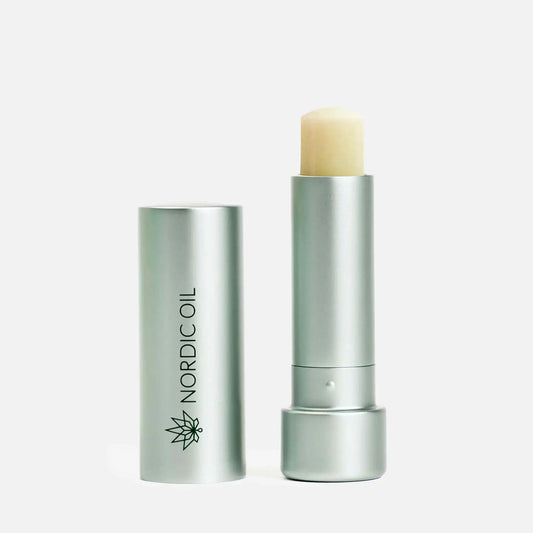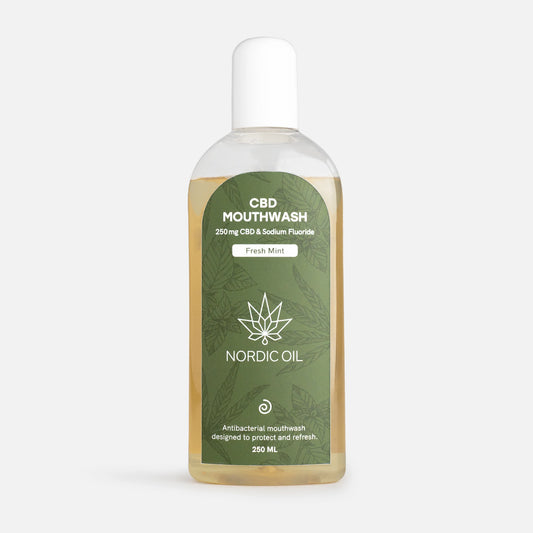-
Regular price £69.00Sale price £69.00 Regular price
CBD Gummies (1500 mg) Berries
150 g -
Regular price £43.00Sale price £43.00 Regular price
CBD Gummies (900 mg) Strawberry
150 g -
Regular price £34.00Sale price £34.00 Regular price
CBD Gummies (600 mg) Relax
160 g -
Regular price £8.00Sale price £8.00 Regular price
CBD Lip Balm
4,8 g -
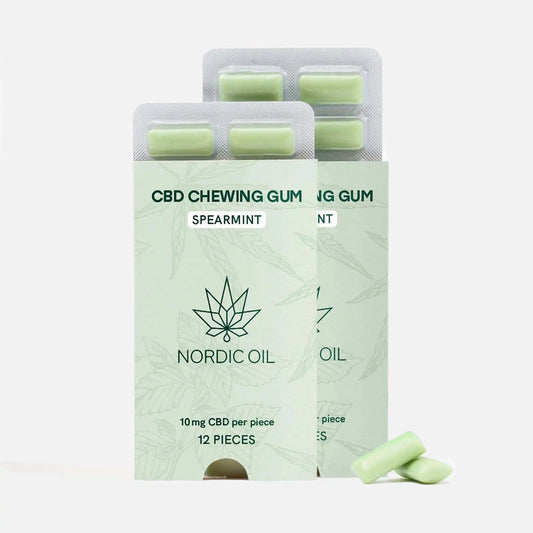 Regular price £5.60Sale price £5.60 Regular price
Regular price £5.60Sale price £5.60 Regular price£8.00CBD Chewing Gum
Sale32 g -
Regular price £8.95Sale price £8.95 Regular price
CBD Mouthwash
250 ml

CBD Supplements
Nordic Oil CBD supplements have a unique liposomal formula that helps protect the useful substances from being broken down by the digestive enzymes when passing through the body. Whether we are considering food or supplements, higher bioavailability is indispensable. Therefore, by combining CBD with supplements, we can offer even greater bioavailability.
Each type of CBD product has a unique method through which it delivers desired cannabinoids into your system. Supplements come in several forms, such as gummies, capsules, liquids containing CBD, vitamins, and minerals.
Although the market demand for supplements is widespread, there is no universal accord on categorising products into supplements, natural health products, dietary supplements, or food supplements. That is because of the differences in the legal regulatory framework in every country.
For example, a product recognised as a dietary supplement in one country might be classified under the ‘regulated category’ in another country. This incompatibility between science and law is quite evident, isn't it?! So we intend to support consumers as best we can to make informed decisions.
At Nordic Oil, our commitment to establishing awareness, educating people, and making CBD more accessible is at the forefront of our ethos and resonates in our high-quality and innovative products.
We recommend taking some time to research, understand and make informed decisions while buying Nordic Oil CBD products.
Below is a more detailed summary of CBD supplements.
What are supplements?
Supplements are products intended to supplement our nutritional needs, independent of food. The nutritional requirement for individuals varies depending on gender, age, occupation, metabolism, health conditions, and more.
So we are often asking ourselves: how many nutrients does the body require? How much of this amount is already supplied by the food we eat? How much is actually getting absorbed by the body?
These questions give us a hint about the gap between what is needed by the body, but often not supplied in healthy quantities. Thus supplements can help to bridge the gap and provide essential nutrients, in order to correct deficiencies and help the body to remain healthy.
Examples of supplements
Dietary supplements designed for oral consumption come in varieties of easily consumable forms, such as; capsules, tablets, oils, chewables, powders, syrups, nutrition bars, and more.
Besides dietary supplements, there are also other supplements that are absorbed through distinct routes of administration, in order to supply nutrients for a more specific purpose. Examples are nasal sprays, eye drops, creams, patches, and more.
In general, the role of these supplements is to provide macro, micro, and phytonutrients. Proteins, fats, vitamins, minerals, prebiotics, and amino acids all belong to this category.
What are herbal supplements?
Products derived from plants and herbs such as oils, seeds, roots, flowers, and berries are generally called herbal supplements. The culinary and therapeutic significance of herbs in our daily diet is recognised by more and more people.
Supplements made of herbs that contain vitamins and minerals are available in the form of capsules, oils, extracts, tinctures, concentrates, and liquids.
What is CBD?
CBD is one of the ‘cannabinoids’ that is naturally present in the cannabis plant.
In simple terms, ‘cannabinoids’ are active chemical compounds that are present in many plants. However, the term cannabinoid is often associated with only one type of plant- the cannabis plant. Cannabidiol (or CBD as many of you will know it), is one of the most popularised and well-researched Cannabinoids.
So far, research has led to the discovery of more than 500 natural chemical ingredients from cannabis. Yet less than one hundred cannabinoids have actually been identified. Among them, CBD is the most familiar. So it is important to consider that because of this, there is still a lot of knowledge to be gained from unidentified cannabinoids.
Other cannabinoids from the cannabis plant, which have already been identified and researched, include THC, CBN, THCV, CBG, CBC, CBL, and many more.
Each of these cannabinoids possesses different qualities due to their distinct chemical structures, of which CBD is the most extensively studied. CBD does not exhibit psychoactive effects because its molecular structures are aligned differently.
Is CBD natural?
Cannabidiol (CBD) is a naturally occurring compound found in the cannabis plant. Today, CBD is gaining more attention and reputability in various markets and areas of research. Other Marijuana varieties have higher proportions of THC compared to CBD, (which must include less than 0,2% THC to be legal in the UK and EU).
Moreover, hemp belongs to the oilseeds family. Hence the CBD extracted from hemp seed oil is a rich source of proteins, fats, and fiber together provide a concentrated source of energy that is 100% natural.
When should I take supplements?
The main objective of including supplements in your routine is to fill in the nutritional gap that your regular diet fails to provide and make up for the deficiencies of essential nutrients in the body. Similarly, people recovering from an injury, health issue, or surgery may need to boost their nutrient intake by incorporating high dosage supplements.
However, in order to attain these objectives and gain the required benefits, the supplement intake must be effectively absorbed by the body. Digestive processes, for example, could deplete the nutrients before they are absorbed by the body.
In this respect, determining the most effective time for taking supplements is also essential. Taking certain supplements could work best on an empty stomach, while others after a meal, for example.
In general, taking them as directed and recommended on the label of the product is a safe practice. Additionally, consultations with a medical advisor may help to establish an appropriate routine and dosage for your intake.
Why do we need supplements?
Studies have shown that the association between food and the functioning of the brain is critical. That is because nutrients help combat mental health conditions, including depression, stress, and mood swings. Therefore the benefits of supplements are widespread and can cater to both physical as well as mental health needs.
Some people may be lacking in nutrition due to their lifestyle choice, for example, unhealthy eating habits, unscientific diet plans, vegan diets, or those who are allergic to certain food groups. Taking supplements could therefore be beneficial in such cases.
Age and gender are also contributing factors for incorporating supplements into your diet. Because as you age, absorption slows down and results in a nutritional imbalance. There are also differences in nutritional requirements for men and women.
Increased use of harmful chemicals and pesticides in plants affects the quality of food and the soil. These chemicals cause damage to our immune system. Intake of additional vitamins and minerals helps reduce this damage and support our strengthen our immune systems.
Is it safe to take CBD every day?
Considering the safety profile of CBD, there is no record of adverse effects on account of incorporating CBD into your everyday routine. If you are a beginner, starting with a low dose and increasing gradually is always the safest route. You can then moderate your dosage as needed, according to how your body responds.
Once you begin using CBD, observe the changes and try to find answers to these two questions:
- Which forms of CBD work best for me and my lifestyle?
- What dose of CBD is my body able to absorb or tolerate each day?
If you choose to take CBD supplements in the form of multivitamin liquids, then you may, if necessary modify your dosage accordingly, once you have finished your first bottle. Any increases in dosage should however be discussed with a physician.
On-the-go supplements like CBD Chewing Gum can easily be adapted into part of your daily routine.
Keep in mind that vitamin deficiencies could lead to chronic conditions, therefore maintaining a balanced multivitamin intake is essential.
That said, nothing can equate to a balanced nutritious diet, an active lifestyle, and a happy state of mind. In this respect, supplements can be considered as a bonus to a healthy meal.
Which supplement is the right one for me?
The market today is flooded with supplements. So, choosing the right product might be an overwhelming process.
Therefore, when it comes to taking supplements, adopting a personalised approach could provide more benefits. It might help to map out your current lifestyle habits and daily activities, in order to analyse your diet, fitness routines, work commitments and establish any influences caused by specific health problems or injuries.
Remember to include general deficiencies and those related to your skin health, sleeping troubles, allergies, immunity, hair loss, appetite, energy levels, and bone health. You may add more to the list if required.
Now, with this information outlined, it is easy to set your health goals.
This personalised approach is your tool kit for attaining good health. Take medical advice from your personal health consultant to determine the recommended daily intake of supplements.
Immunity Drops, CBD Liposomal Multivitamin Liquids, and CBD Chewing Gum are the range of CBD products from the supplement category for you to choose from.
If you have further questions on the topic of CBD supplements, our customer support team is happy to help you with all your queries via phone, chat, or email.
Safety and side effects
CBD products have a good safety profile in general. When it comes to CBD supplements, take your dosage as directed. If you are taking any other medications, be sure to check for any potential interactions with CBD.
An overdose of supplements on a case-to-case basis may cause nausea, diarrhea, or stomach cramps. In such a situation, stop taking the product and consult your physician.

